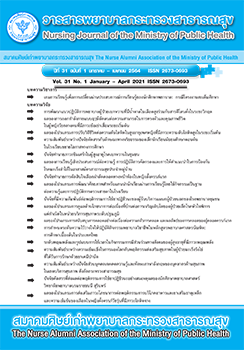Effects of a Capacity Development Program for Student Leaders Through Activity-based Learning on Knowledge and Practices of Visual Examination in a School
Main Article Content
Abstract
Vision impairment is one of a health problem among school students. This study aimed at investigating the effects of a Capacity Development Program on knowledge and practices among student leaders for visual examination in a school through Activity Based Learning (ABL) at Wat Weruwan School, Chiang Mai. The sample consisted of 33 student leaders. The instruments used in this study included a general information questionnaire, knowledge assessment form on visual examination, practice assessment form on visual examination, and a capacity development program for student leaders. The overall content validity indexwas 0.93 and reliability of knowledge assessment form and practices form were 0.77 and 1.00, respectively. The research was divided into three phases: pre-activity, implementation, and evaluation. The data were analyzed using frequency, percentage, means, standard deviation, a paired sample t-test and McNemar test. The results showed that student leaders had higher average scores of visual examination knowledge with statistical significance (p<.001) and student leaders had a more accurate ability of visual examination practices at the school with statistical significance (p<.001). Therefore, we can use a Capacity Development Program to develop the capacity of student leaders for visual examination.
Article Details
บทความและรายงานวิจัยในวารสารพยาบาลกระทรวงสาธารณสุข เป็นความคิดเห็นของ ผู้เขียน มิใช่ของคณะผู้จัดทำ และมิใช่ความรับผิดชอบของสมาคมศิษย์เก่าพยาบาลกระทรวงสาธารณสุข ซึ่งสามารถนำไปอ้างอิงได้
References
2. Amornsakchai A, Singhaniyom S, Sresumatchai V. Modification a commercial eye care screening software for Thai preschool children a pilot study. Journal of Public Health 2009;39(1);74-88. (in Thai)
3. Thai Health Promotion Foundation. Used computer-smartphone long-term make a myopia [Internet]. Bangkok:2014. [cited 2019 March 21]. Available from:https://www.thaihealth.or.th/Content/26066-ใช้’คอมฯ-สมาร์ทโฟน’ นานทำสายตาสั้น.html.
4. Bureau of Health Promotion, Department of Health, Ministry of Public Health. Vision screening guide in kindergarten and elementary school level. 3nd ed. Bangkok: National Buddhist Department Printing;2014. (in Thai)
5. National Associated of School Nurse. Vision and eye health [Internet]. Washington D.C. 2017 [cited 2019 March 21]. Available from: https://www.nasn.org/nasn-resources/practice-topics/vision-health.
6. Lim MC, Gazzard G, Sim EL, Tong L, Saw SM. Direct costs of myopia in Singapore. Eye 2009;23(5):1086-9.
7. Phonchai B. Health Status’s of grade 7 student and environment sanitation of a secondary school at Nakhon Phanom municipality district during the academic year 2009. KKU Journal for Public Health Research (KKU-JPHR) 2011;4(3):31-40. (in Thai)
8. Al-Jammal K, Ghamrawi N. Leading the self: self-leadership skills of lebanese private school principals. International Journal of Social Science and Economics Invention 2015;1(02):92.
9. Chaninyuthwong, V. Parent’s guide…school-age caring book. Bangkok: The Agriculture Cooperative Federation of Thailand. Limited; 2009. (in Thai)
10. Surin primary Educational Service Area 3, Office of the Basic Education Commission. Concept of activity reduce study time increase knowledge time book. Surin: Surin primary Educational Service Area 3;2015. 1719. (in Thai)
11. Regional Education Office N0.1, Office of the Permanent Secretary, Ministry of Education. The study of management of the moral school under office of the basic education commission in regional education office no.1. Bangkok: Office of the Permanent Secretary, Ministry of Education;2018. (in Thai)
12. Srimahawaro W. The potential development strategy of citizenship in democratic system: a case study of youth, Surattani province. Suratthani Rajabhat Journal 2020;7(1): 148-65. (in Thai)
13. Nabundit R, Tangvoraphonkchai J. The effects of innovation in providing health information and health game on self-care behaviors for adolescent SLE patients admitted in hospital. Journal of Nursing Science and Health 2012 Jun 16;35(1):10-7. (in Thai)
14. Psychology Notes HQ. Erik Erikson’s theory of psychosocial development. Internet]. Singapore: 2019. [cited 2019 March 21]. Available from: https://www.psychologynoteshq.com/erikerikson/
15. Srimanop S, Nitisiri P, Kruea-In N. The development of seventh grade students ability in application of thermal energy in daily life through context-based learning. Journal of Education and Human Development Sciences 2019 Mar 8;3(1):74-84. (in Thai)
16. Sagunee N, Makanong A. The development of attitude, achievement motivation and mathematics learning behavior of ninth grade student by using activity-based instruction. An Online Journal of Education 2017; 12(2):50-66. (in Thai)
17. Azuka BF. Activity-based learning strategies in the mathematics classrooms. Journal of Education and Practice 2013;4(13):8-14.
18. Lerdseripattanakul M, Ugsonkid S. The study of effects of learning management by using activity-based learning and practicing student to giving examples and counterexamples on “probability” of mathayomsuksa three student. EAU Heritage Journal Social Science and Humanity 2019 Aug 5;9(2):115-25. (in Thai)
19. Mongkolsiri N. Effect of using activity series by applying action learning approach on attitude and safe biking of senior primary school students [Master thesis]. Bangkok: Faculty of Education, Chulalongkorn University. 2017. (in Thai)

